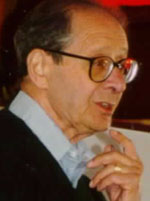
Harold Garfinkel
What is Ethnomethodology?(3)
Accounts, Accounting, and Accounting Practices (see this)
Examples
JSTOR Articles:
Ethnomethodology
"Harold Garfinkel (1917- ) is the founder of a field of study called ethnomethodology. Ethnomethodology is a theory that describes the variety of techniques that people use to understand, and make their way through, everyday life. One of the ways that people make sense of their lives and relationships to others is through accounting practices. These are the various ways in which people justify or make sense of their actions to themselves and others. Ethnomethodologists argue that accounts are reflexive, which means that by offering accounts of ourselves to others, we also change the situation and the possibility for interaction within that situation. Ethnomethodologists have also used breaching experiments to understand the way that people construct social reality. In these studies, ethnomethodologists engage in activities that violate the taken-for-granted assumptions of everyday life, and watch to see how other social actors repair or reconstruct the breach in the social fabric. These studies show how people order their everyday lives and how they cope with challenges to that everyday order. Garfinkel has also shown how the presumably natural category of gender is socially constructed. In his interviews with Agnes, Garfinkel learned that gender is a social accomplishment that requires constant attention to the commonplace practices that allow people to pass as men or women."(1)
Websites
The International Institute for Ethnomethodology and Conversation Analysis: http://www.iiemca.org/
Paul ten Have's Ethno/CA News: http://www.paultenhave.nl/
quiz.
Works Cited
1.
Much of this page comes from the "Instructor's Manual" to accompany Contemporary
Sociological Theory and Its Classical Roots: The Basics, Second Edition,
George Ritzer, Mcgraw-Hill, 2007. The Instructor's Manual was prepared by James
Murphy, University of Maryland, College Park and Todd Stillman, Fayetteville
State University. These excerpts are from chapter 6.
2. Ritzer, George. 2007/2010/2013. Contemporary Sociological Theory and Its Classical Roots: The Basics. 2nd/3rd/4th editions. St. Louis: McGraw-Hill
3. Student Presentation from Iowa State University, http://www.soc.iastate.edu/sapp/soc401gp.html,
Spring 2008 Sociology 401, taught by: Dr. Steve Sapp, accessed 10/15/08)
4. Ritzer, George. 2008. Modern Sociological Theory,
Chapter 7. St. Louis: McGraw-Hill.
5. Liska, Allen and Messner, Steven. 1999. Perspectives on
Crime and Devinace, 3rd edition. Upper Saddle River, NJ: Prentice-Hall.
![]()
Unless otherwise noted, all pages within the web site http://www.umsl.edu/~keelr/ ©2015 by
Robert O. Keel.
Click here to Report Copyright Problems